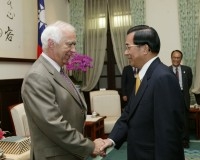President Chen Meets French Parliamentary Delegation

President Chen Shui-bian received this afternoon a group of members from the French National Assembly, led by Dr. Denis Jaquat, President of the delegation.
President Chen said that the visit by the French representatives, all of whom members of the French ruling party and parliamentary heavy weights, shows fully the concern and support that France has for Taiwan. Jaquat is a frequent visitor to the island, with the last visit dated back to August 2002. Though he resigned from the post as president of the France-Taiwan parliamentary friendship group in October that year, it is heartening to learn of Jaquat's continuous interests regarding the Taiwan issues. Jaquat extended his warm welcome in November 2001 when First Lady Wu Shu-jen made a stopover in Paris en route to Strasbourg, where she received the International Freedom Prize conferred by Liberal International on behalf of President Chen. The president again owed his gratitude to Jaquat for his hospitality.
President Chen noted that there have been frequent exchanges between Taiwan and France in economy, business, technology and culture, with the amount of bilateral trade reaching 3.9 billion Euros. It is believed that the room for trade growth is still enormous, especially when Taiwan stands as one of France's five Asian trading partners. The president hoped that trade exchanges and business ties between the two countries can be strengthened further.
Meanwhile, President Chen hailed the dual executive system of the Fifth Republic of France as the model that Taiwan should learn from as the country's constitutional system resembles that of France. However, Taiwan's effort in modeling on the French system has not been successful, and so problems have occurred as a result. According to the Taiwan constitution, the president is not bestowed the power to dissolve the parliament, nor is the parliament given the right to veto the Cabinet. There has been voice in Taiwan that the parliament should be given the power to conduct confidence vote regarding the Cabinet, and that the president should nominate candidates who are agreed by the majority of the parliament as premier. Chen noted, however, whoever supporting this idea should be aware that the president would be entitled the right to dissolve the parliament, just as the dual executive system in France does. Chen suggested that the proposal be given full consideration and be tailored to meet the need of Taiwan rather than the interests of particular groups in Taiwan.
The French revolution in 1789 gave birth to the political beliefs of freedom, equality and fraternity, said the president, and these beliefs have spread throughout the world from France to Europe, and then to Taiwan. Taiwan's hope to join the World Health Organization and to return to the United Nations echoed such universal values and spirits. The president stressed that out of the spirit of equality, the welfare of the 23 million people of Taiwan should not be excluded from the world community. Of more than 190 countries in the world, Taiwan is the only one that is not represented in the U.N. The U.N. Resolution No. 2758 only gave the seat to the People's Republic of China, while leaving the people in Taiwan unheeded. As the annual U.N. General Assembly plenary session is set to begin on September 13, President Chen urged that France show concern for the 23 million Taiwan people. Taiwan also looks forward to France's assistance to its U.N. bid, he said, and if France cannot extend a helping hand in this regard, it should at least refrain from explicitly speaking against Taiwan's cause.
On French President Chirac's proposal of lifting arms embargo on China, the president regarded it as violating the beliefs of freedom, equality and fraternity on which France has been founded. China is not a democratic country and has passed a so-called "anti-separation law" this March, trying to use non-peaceful means to solve the cross-strait differences. The reason for the European Union to impose embargo against China is out of its concerns for the Tiananmen Massacre in 1989. China has failed to improve its human rights records over the past 16 years, and has even tried to use force against Taiwan. Lifting the embargo would amount to encouraging the undemocratic China to attack against the democratic Taiwan. It is the president's hope that the French guests urge their government to think over the embargo issue.
Jaquat expressed his full understanding about the president's request, while extending his appreciation for the reception given by the president. Jaquat said he has good comprehension about the situation of Taiwan in the international community as well as its efforts in trying to join the WHO and U.N. He will offer assistances in these respects after returning to France.